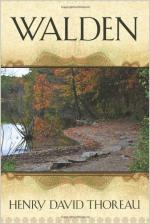|
|
Walden Where I Lived, and What I Lived For
This chapter begins with a description of The Hollowell Place, a local farm, which Thoreau visited often. He talks about carrying off its scenery in his head because it is so beautiful.
Topic Tracking: My House Outdoors 2
The subject matter abruptly shifts to his house, which had many holes between boards and in the roof. This meant that it did not lose the freshness of the outdoors, which was very important to Thoreau. He then gives a close account of the area around Walden, which was in a large forested area between the villages of Concord and Lexington. He writes about the incredible stillness of the water, and then muses on the importance of water on earth.
He says that water protects against the "insularity" of the earth, and reminds us that the earth is not entirely solid. In the morning he bathes in the pond. He says this wakes him up, which is the most important thing to do.
Topic Tracking: Awakening for Reform 1
By waking up fully in the morning, a person is able to undertake moral reform during the day. Once a person has thrown off sleep, including moral slumber, they can think clearly about moral imperatives.
"I went to the woods because I wished to live deliberately, to front only the essential facts of life, and see if I could not learn what it had to teach, and not, when I came to die, discover that I had not lived. I did not wish to live what was not life, living is so dear; nor did I wish to practice resignation, unless it was quite necessary. I wanted to live deep and suck out all the marrow of life, to live so sturdily and Spartan-like as to put to rout all that was not life, to cut a broad swath and shave close, to drive life into a corner, and reduce it to its lowest terms, and, if it proved to be mean, why then to get the whole and genuine meanness of it, and publish its meanness to the world; or if it were sublime, to know it by experience, and be able to give a true account of it in my next excursion." What I Lived For, pg. 101
Thoreau returns to railroads, which were an important issue for him. The Fitchburg Railroad line runs by the corner of Walden Pond many times daily. We need railroads only because we build them. The availability of things that the railroad provides causes a hunger for irrelevant news (which he says is repetitive and predictable), and mail.
He says that children, who play at life, know what it means better than the rest of us, who live it with such seriousness. In keeping with this lightness, he says that it appears that the best thing to do with his head is burrow it in the sand. Then, he says that we need a "Realometer" to keep us from getting too far from what's important in life.




